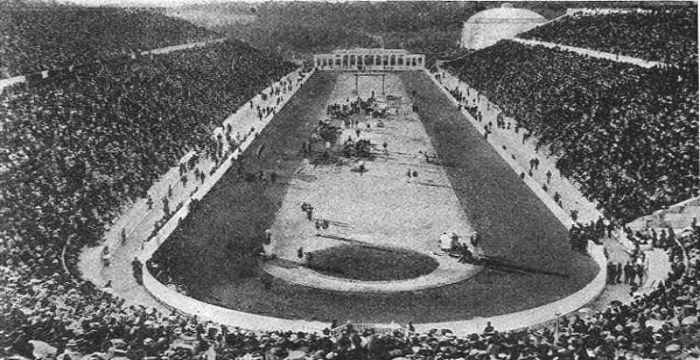
On April 6, 1896, the Olympic Games, a long-lost tradition of ancient Greece, are reborn in Athens 1,500 years after being banned by Roman Emperor Theodosius I.
At the opening of the Athens Games, King Georgios I of Greece and a crowd of 60,000 spectators welcomed athletes from 13 nations to the international competition.
The first recorded Olympic Games were held at Olympia in the Greek city-state of Elis in 776 B.C., but it is generally accepted that the Olympics were at least 500 years old at that time. The ancient Olympics, held every four years, occurred during a religious festival honouring the Greek god Zeus. In the eighth century B.C., contestants came from a dozen or more Greek cities, and by the fifth century B.C. from as many as 100 cities from throughout the Greek empire.
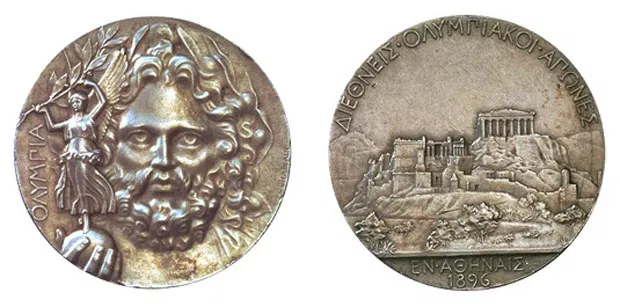
Initially, Olympic competition was limited to foot races, but later a number of other events were added, including wrestling, boxing, horse and chariot racing, and military competitions. The pentathlon, introduced in 708 B.C., consisted of a foot race, the long jump, discus and javelin throws, and wrestling. With the rise of Rome, the Olympics declined, and in 393 A.D. the Roman Emperor Theodosius I, a Christian, abolished the Games as part of his efforts to suppress paganism in the Roman Empire.
With the Renaissance, Europe began a long fascination with ancient Greek culture, and in the 18th and 19th centuries some nations staged informal sporting and folkloric festivals bearing the name “Olympic Games.”
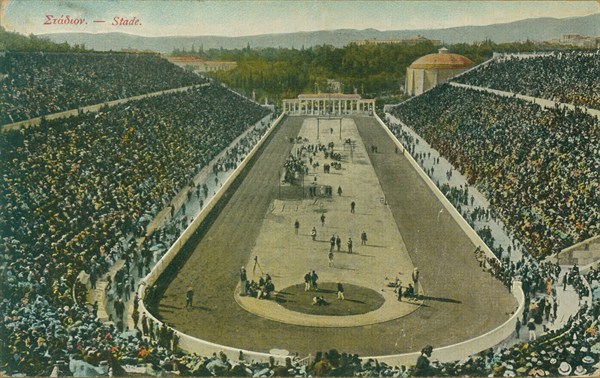
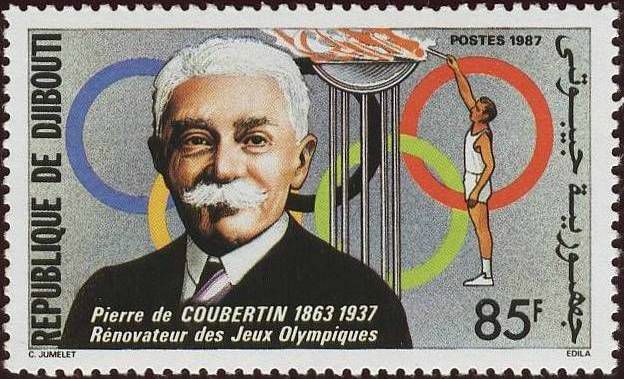
However, it was not until 1892 that a young French baron, Pierre de Coubertin, seriously proposed reviving the Olympics as a major international competition that would occur every four years. At a conference on international sport in Paris in June 1894, Coubertin again raised the idea, and the 79 delegates from nine countries unanimously approved his proposal.
The International Olympic Committee (IOC) was formed, and the first Games were planned for 1896 in Athens, the capital of Greece.
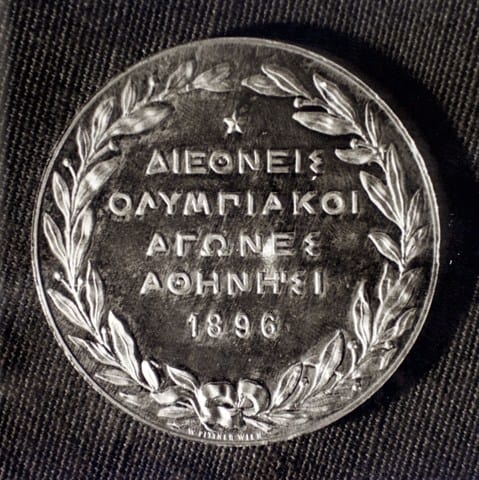
In Athens, 280 participants from 13 nations competed in 43 events, covering track-and-field, swimming, gymnastics, cycling, wrestling, weightlifting, fencing, shooting, and tennis. All the competitors were men, and a few of the entrants were tourists who stumbled upon the Games and were allowed to sign up.
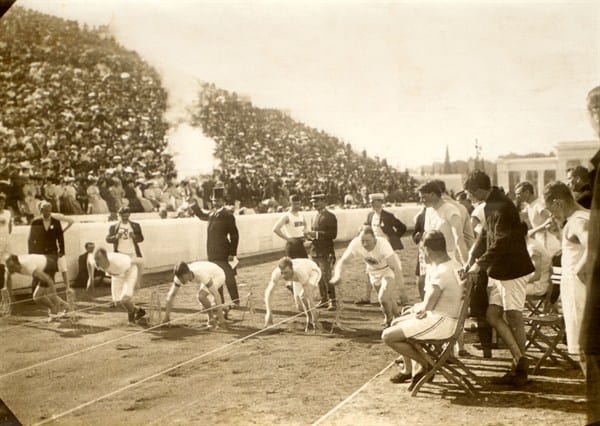
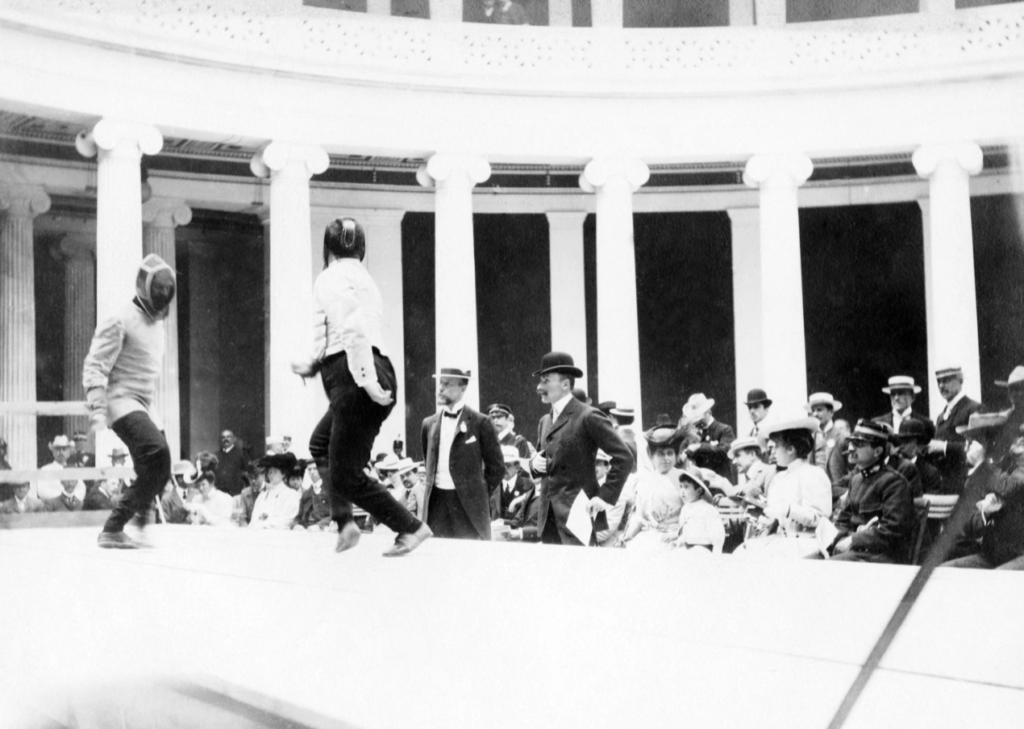
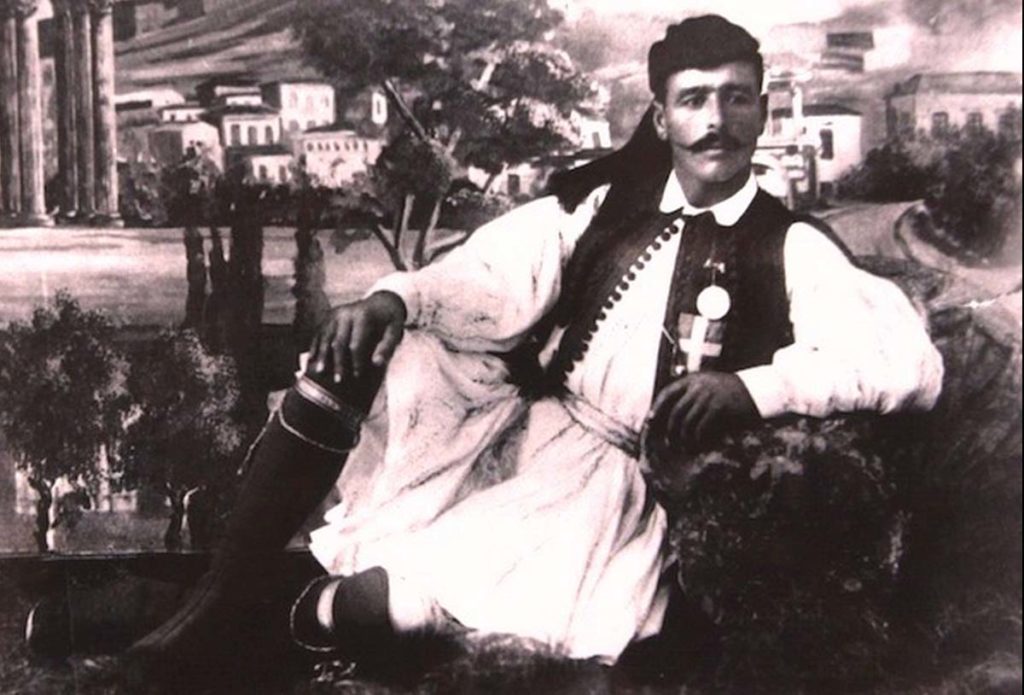
The track-and-field events were held at the Panathenaic Stadium, which was originally built in 330 B.C. and restored for the 1896 Games. Americans won 9 out of 12 of these events. The 1896 Olympics also featured the first marathon competition, which followed the 25-mile route run by a Greek soldier who brought news of a victory over the Persians from Marathon to Athens in 490 B.C. In 1924, the marathon was standardised at 26 miles and 385 yards. Appropriately, a Greek, Spyridon Louis, won the first marathon at the 1896 Athens Games.
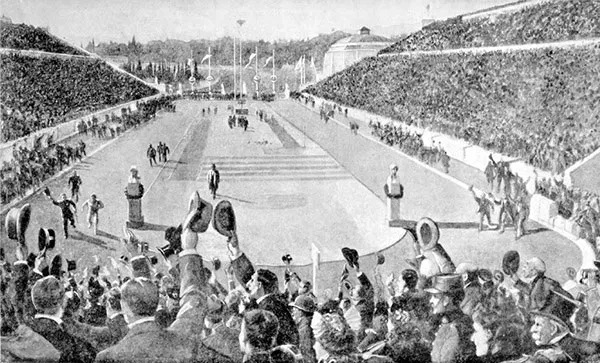
Pierre de Coubertin became IOC president in 1896 and guided the Olympic Games through its difficult early years, when it lacked much popular support and was overshadowed by world’s fairs.
In 1924, the first truly successful Olympic Games were held in Paris, involving more than 3,000 athletes, including more than 100 women, from 44 nations. The first Winter Olympic Games were also held that year. In 1925, Coubertin retired.
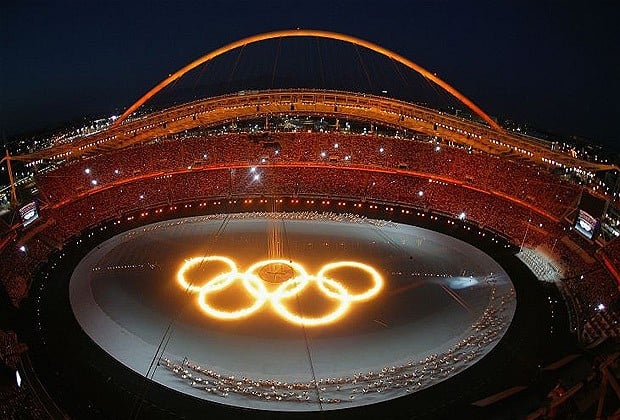
The Olympic Games have come to be regarded as the foremost international sports competition.
At the 2000 Summer Olympics in Sydney, more than 10,000 athletes from 200 countries competed, including nearly 4,000 women.
In 2004, the Summer Olympics returned to Athens, with more than 11,000 athletes competing from 202 countries. In a proud moment for Greeks and an exciting one for spectators, the shot put competition was held at the site of the classical Games in Olympia.
*Source: History


Founders of the Modern Olympics
Dear Sir
I must express my disappointment with the absurd claim that de Coubertin alone resuscitated the modern Olympics.
This belittles and denies the pioneering thoughts of Alexander Soutsos, the personal and financial support of Epirotes Evangelos Zappas and George Averoff and the sporting leadership of the very first IOC President, Dimitrios Vikelas. Even IOC archives support what they achieved, but unless we Hellenes stand up, the truth will remain in those archives.
Alexandros Soutsos’ Idea
Alexandros Soutsos was a famous Hellenic poet. In 1833, the newspaper Helios published his poem, where he referred to the necessity for reviving the Olympic Games. The newspaper was published in Nafplio, the first capital of the new born Hellenic state, in the Peloponnese.
Plato
If our shadow could fly to your earth it would daringly shout to the Ministers of the Throne: Leave your petty politics and vain quarrels Recall the past splendour of Hellas. Tell me, where are your ancient centuries? Where are your Olympic Games? Your majestic celebrations and great theatres? Where are your sculptures and busts, where are your altars and temples?
Every city, every wood and every temple was filled before with rows of silent marble statues. Foreign nations decorated your altars with offerings, gold jars from Gygas. Creators, silver plates and precious stones from Croesus. When the glorious Olympic festival opened, large crowds gathered to watch the games where athletes and kings came to compete, Ieron and Gelon and Philip and others. Before forty thousand bedazzled Hellenes, Herodotus presented in his elegant history their recent triumphs. Thucudides listened to the beautiful harmony of his prose and prepared to meet him in competition as a worthy rival.
(G. Dolianitis, Vikelas, First I.O.C. President, International Olympic Academy, [S.Y.])
Influenced by the ideas of that poem, the great philanthropist Evangelos Zappas proposed the revival of the Olympic Games. Zappas was born in 1800 in a village at Epirus, Northern Hellas. In 1831 he emigrated to Bucharest, where he became one of the most important and wealthiest land-owners in the country.
Influenced by the poem by Alexandros Soutsos, in which he claimed the need for reviving the Olympic Games to bring hope back to the Hellenic people after the war of independence, Zappas decided to propagate the idea and to personally finance the effort. After his agreement with the Hellenic Government, the Zappian Olympic Games were founded. Zappas financed the erection of a building for exhibits, as well as the excavation and restoration of the ancient Panathenaic Stadium in Athens.
Zappas died in 1865, leaving his immense fortune for the benefit of the modern Olympics with the purpose to be held every four years “in the manners of our ancestors”. De Coubertin was to use this money to achieve what Zappas had begun.
According to his will, his body was buried in Romania, and his skull at the new Olympic building located in Zappeion, Athens. Visitors can still see the inscription at Zappeion: “Here lies the head”. De Coubertin copied the idea and had his heart buried at Mt Olympus with the inscription “Here lies the heart”, just as he copied many other ideas regarding the Olympics.
As the renovation of the ancient Stadium was not yet completed, the Games of 1859 took place in Loudovicos’ Square (today’s Omonoia Square, in the center of Athens). All the official representatives – the Royal Family, Government MPs, Military and Public Authorities – and many thousands of people attended.
As it was one of the first mass gatherings in the country, neither the people nor the police had any previous experience of keeping the necessary order for the event.
The athletic competition had more a game-like than sportive character. As there were no athletes at that time, the Organising Committee accepted the participation of workers, porters, etc., who were attracted by the monetary prizes of the Games. According to the press of the time, many anecdotes took place during the Games: a policeman who was there keeping the order, left his post and participated in the races. Even a beggar, who pretended to be blind, participated in the races as well!
While the press criticised the Games, the ideal of the athletic competition was generally accepted, and this was the beginning of the whole process of the Olympic Games.
The Games of 1870’s took place in the restored Stadium. At that time the organization was much better:
There were nine games: three classic ancient games, four ancient, but not classic games, and two modern. Prizes were both monetary and symbolical. There was a band playing an Olympic Hymn, specially composed for the occasion. The judges were professors of the University, and a herald announced the winners. The King awarded prizes to winners to the sound of the hymn.
The 1870’s Games were an enormous success and the press dedicated triumphal articles both to the organization and to the accomplishment of the Games. More Games were to follow in years to come.
Demetrios Vikelas was born in 1835 in Syros, and died in 1908 in Athens. He was a merchant in London, but since literature was his real love, he soon became a well-known writer.
In 1894, he took over the initiative of establishing the modern Olympic Games. After becoming a member of the Panhellenic Gymnastic Society in Athens, he represented the Society in the International Athletic Congress of 1894 held in Paris. There, he made the first speech suggesting that Athens should be the site of the First International Olympic Games to be held in 1896.
“I claimed Hellas’ rights with regard to the re-establishment of a Hellenic institution. Indeed, as Victor Hugo put it, the whole civilized world has a common grandmother, but we [the Hellenes] have her as our mother. So we are in a way the uncles of the rest of the peoples. Here is our only advantage, if it is an advantage. Here is the source of my request that the restored Olympic Games be inaugurated on our Hellenic soil”.
After the acceptance of the proposition, Athens became the site of the first institutionalised Olympic Games and Vikelas became the first president of the new-born International Olympic Committee.
George Averoff, another Hellenic benefactor from Epirus as was Averoff, was a resident of Alexandria. He personally financed the erection of the Athens Polytechnic School, the Military Academy and the High School and the Girls Institution at Alexandria.
When the Committee for the renovation of the Panathenian Stadium asked him to contribute, Averoff stated that he would undertake the renovation of the ancient Panathenian Stadium, at his own expense.
Subsequently, George Averoff was greeted by all Hellenism as the principal establisher of the Olympic Games. In memory of his patriotism, his statue was erected in front of the Stadium on the eve of the beginning of the Games.
So given all of the foregoing, available on the internet and confirmed via IOC Archives, how is it that the Hellenic nation has ever allowed Pierre de Coubertin to claim all of the credit for founding the modern Olympics. Even the Athens 2004 website erroneously gave him credit without any mention of Soutsos, Zappas, Vikelas and Averoff.
Yet without these men there would have been no idea for reviving the Games, no motivation and impetus and certainly no money.
It is time that the world recognised what the Hellenes did, over a century ago but which they too have now forgotten.
Ange T Kenos (Olympic certified weightlifting coach)